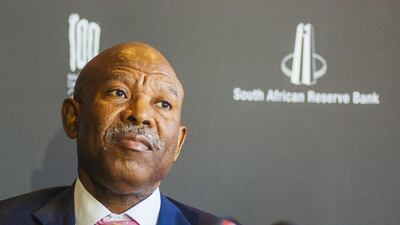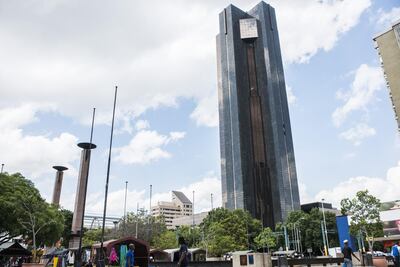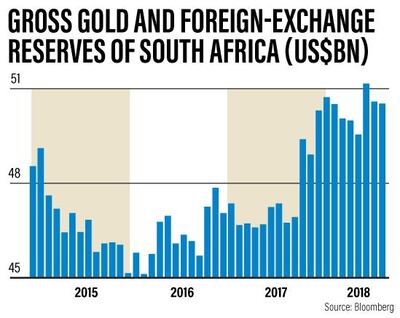South Africa’s Lesetja Kganyago has a fight on his hands to protect the central bank’s $50 billion (Dh183bn) of reserves.
More than eight months after the ruling African National Congress decided that the South African Reserve Bank should be state-owned, like most other central banks, the governor said his main concern remains to protect the regulator’s independence and mandate.
But also at risk may be billions of dollars in reserves and a legal brawl that could last for years. While the 97-year-old Reserve Bank’s shares are only worth about 20 million rand (Dh5.1m) based on the current share price, some shareholders have argued the bank’s assets belong to them and they should be compensated for that when the government nationalises the institution, according to Mr Kganyago.
Eight per cent of its 770 owners are foreigners, so steps to nationalise could be challenged using bilateral investment treaties or end in international arbitration.
“This is not a fight I want to be busy with,” Mr Kganyago said in his 32nd floor office in the capital, Pretoria. “There is sufficient emerging-market turmoil that keeps me busy. I should not be wasting my time on this thing.”
South Africa's rand extended the worst decline among emerging-market peers as data showed the country's economy slipped into a recession this week for the first time since 2009. It stood at 15.3 to the dollar early afternoon on Thursday UAE time.
South Africa had $50.5bn in gross reserves (gold and foreign exchange) at the end of July, slightly down from a three-year high of above $51bn in May, and holds about 170bn rand of deposits on behalf of the state, according to central bank data.
Some shareholders “want to be paid to go away”, Mr Kganyago said. “‘Show me the money, show me the money!’ is what they are looking for.”
South Africa’s central bank is one of a handful, including Switzerland and Japan, still owned by private individuals.
However, shareholders are limited to 10,000 shares each and have no say over monetary policy. They get to vote for seven of the central bank’s 10 non-executive directors. “Why should we be paying people who are in any case at the moment very constrained,” Mr Kganyago said.
The former head of the National Treasury, 52, fought off a proposal by the nation's anti-graft ombudsman last year to change the constitution to take away the regulator's inflation-target mandate. Last month, the radical Economic Freedom Fighters political party, which has won support by vowing to nationalise everything from land to banks, tabled a bill to make the Reserve Bank state-owned.
If the law is passed, the change would be mainly cosmetic. That's unless it is used as a gateway to meddle with the mandate again, the governor warned.
“Is this a Trojan horse?” Mr Kganyago said. “If it leads to a point that there is that debate about the mandate of the bank and the independence of the Reserve Bank – check what happened with Turkey, check what happened in Argentina, check what happened in Venezuela. If you want an African example, check what happened in Zimbabwe.”
“Should they interfere with our independence, they’ve got a fight on their hands,” he said.
The maximum price over the past six months for a Reserve Bank share, which is available over the counter since they delisted in 2002, has been 10 rand. Investors share a maximum dividend payout of 200,000 rand a year.
The stock is a “horrible investment”, according to shareholder Dawie Roodt, the chief economist at financial services company Efficient Group. He bought his shares more than two decades ago because they allow him access to the central bank’s annual meetings, where he can speak to its managers, Mr Roodt said.
Previous governors had an acrimonious relationship with some shareholders. Tito Mboweni accused one of disrespect in 2009 when the barefoot investor dressed in lederhosen, a traditional Bavarian garment, disrupted his AGM.
During Mr Kganyago’s four years at the helm, those gatherings have become duller affairs that last less than an hour. If the government does become the sole owner of the bank, the meetings could be over in minutes, he said. The central bank would prefer to leave things as they are.
Should nationalisation take place, Mr Kganyago won’t give up the nation’s assets or allow tinkering with the mandate. “If there’s a dispute over these things, you can rest assured that we will have protracted fights in the courts,” he said.
“Arbitration can rule either way, but the legal costs associated with that are going to be huge, there’s no doubt about that,” Mr Roodt said.
The slide into recession for the country came after the economy unexpectedly contracted in the second quarter, raising the nation's risk profile at a time when emerging-market assets are under pressure from a rising US dollar and global trade tensions. It also increases the chance of a credit downgrade by Moody's Investors Service, which would plunge the country's local-currency debt into junk status.
“Equities, bonds, rands ... It’s awful,” said Abri du Plessis, a portfolio manager at Gryphon Asset Management in Cape Town.
_______________
Read more:
South Africa’s Land Bank says land expropriation could trigger default
South African lender goes into administration amid 'liquidity crisis'
_______________
“I’m struggling to see any light. There is now a distinct possibility that there will be a downgrade by year-end and we won’t see the end of it for South Africa’s markets.”
Derivatives markets are signalling even more pain to come as contagion from crises in Argentina and Turkey spreads and with traders on edge about the ruling African National Congress’s plans for a constitutional amendment to permit expropriation of land without compensation.
Most investors agree land redistribution is crucial to address lingering inequalities between white South Africans – who own 72 per cent of commercial agricultural land, according to a state audit – and black citizens, almost 25 years after the apartheid system of government ended. But they’re concerned about a lack of details and say it could undermine property rights, deter foreign investment and lead to penalties from other countries, according to Morgan Stanley and Standard Chartered.
"Land reform is emerging as one of the key issues and it's clear markets remain nervous," said Razia Khan, head of African research at Standard Chartered in London.
In an extreme scenario, with wide-scale expropriation of land without compensation leading to credit-rating downgrades and debt defaults, the rand could weaken to 24 against the greenback by the end of next year, Investec Bank chief economist Annabel Bishop said in a report on September 3.
A best-case scenario, with land reform benefiting the poor without undermining the economy, could cause the currency to strengthen almost 50 per cent to 7.90 per dollar, she said.



